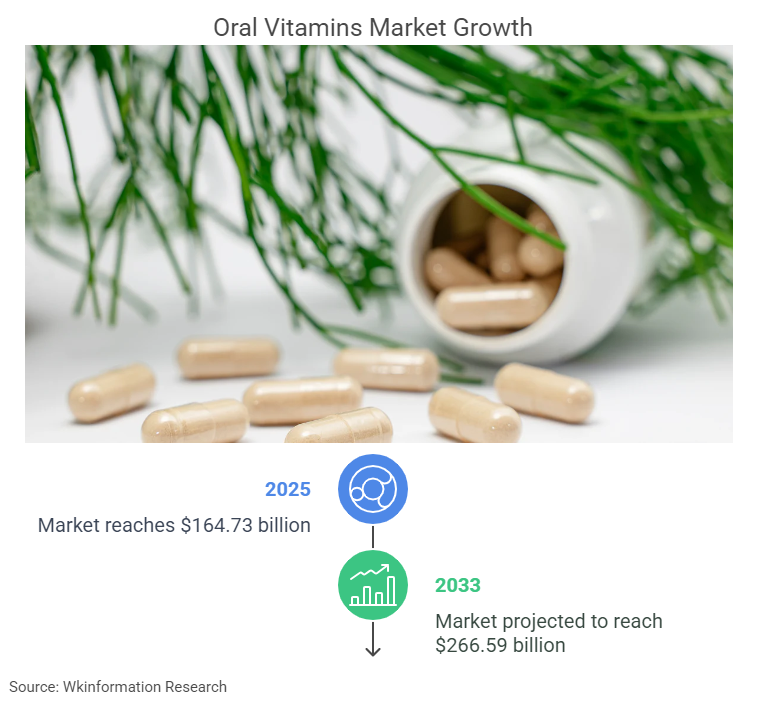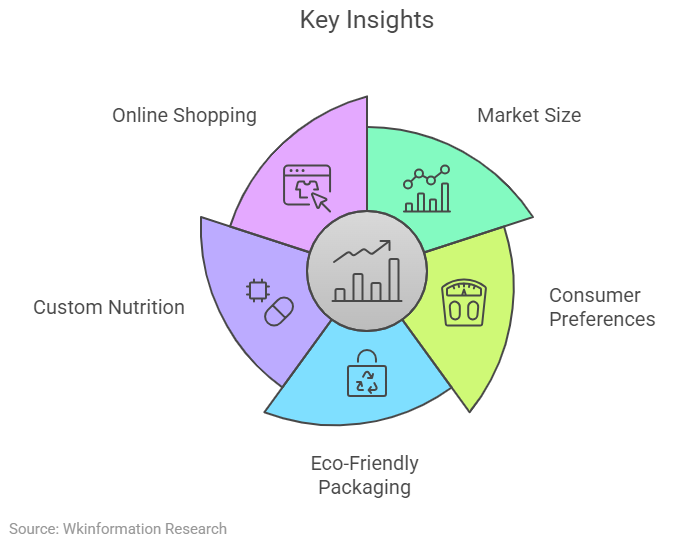
The oral vitamins market is experiencing rapid growth due to increasing health awareness and evolving consumer demand. In 2025, the globa oral vitamins market reached $164.73 billion and is projected to grow at a 6.20% CAGR, reaching $266.59 billion by 2033. Consumers prioritize products with natural ingredients, clinically proven benefits, and ease of consumption. Over 70% of individuals now focus on natural claims, while 58% value taste. These preferences highlight the growing importance of oral wellness solutions that support overall health and convenience.
Key Insights
- The world market for oral vitamins is growing fast. It may reach $266.59 billion by 2033 because people care more about health and natural products.
- People like vitamins that are easy to use, taste nice, and help their health. This shows how important simple designs are.
- Being eco-friendly is a big trend. Shoppers like packaging that helps the planet and brands that get materials responsibly.
- Custom nutrition is becoming popular. Technology helps make vitamins that fit each person’s health needs.
- Online shopping is changing how people buy vitamins. It’s now easier to find many products on the internet.

Market Overview
Current Size and Growth of the Oral Vitamins Market
The oral vitamins market has witnessed rapid growth in recent years. Rising consumer interest in health and wellness has fueled demand for convenient and effective supplements. In 2025, the global dietary supplements market reached a valuation of $164.73 billion. Projections indicate continued expansion, with the market expected to grow at a compound annual growth rate (CAGR) of 6.20%, reaching $266.59 billion by 2033. This growth reflects increasing awareness of the benefits of vitamins and dietary supplements in supporting overall health. Consumers are drawn to products that combine ease of use with scientifically backed benefits, driving innovation in the industry.
Key Drivers in the Global Supplement Market
Several factors contribute to the growth of the global supplement market:
- Health and Wellness Boom: A global focus on health has led to increased adoption of dietary supplements for immunity, chronic condition management, and overall well-being.
- Aging Population: Older adults often require supplements to address age-related health concerns, such as bone density and cardiovascular health.
- Shift Towards Preventive Healthcare: Rising healthcare costs encourage individuals to prioritize preventive measures, including regular use of supplements.
- Sports and Fitness Trends: Younger demographics are driving demand for performance-enhancing supplements like protein powders and amino acids.
- Rising Disposable Income and Urbanization: Emerging economies are experiencing higher spending on supplements due to urban lifestyles and increased disposable income.
These drivers highlight the diverse factors shaping the trends in the global dietary supplements market.
Challenges Impacting Market Expansion
Despite its rapid growth, the oral vitamins market faces several challenges:
- Regulatory Hurdles: Strict regulations on health claims and labeling can slow product development.
- Consumer Awareness: Limited knowledge about the benefits of oral supplements deters potential users.
- Diverse Needs: Catering to varied nutritional requirements complicates production processes.
- Competition from Alternatives: Whole foods and functional foods pose significant competition.
- Supply Chain Issues: Disruptions in ingredient supply chains affect product availability and pricing.
Addressing these challenges will be crucial for stakeholders aiming to capitalize on the growing demand for supplements.
Key Trends Shaping the Oral Vitamins Market

Innovative Delivery Formats
Gummies, Chewables, and Effervescent Tablets
The oral vitamins market has seen a surge in demand for innovative delivery formats. Gummies and chewables appeal to consumers seeking convenient and enjoyable ways to consume supplements. Effervescent tablets, which dissolve in water, provide an alternative for those who dislike swallowing pills. These formats combine ease of use with health and wellness benefits, making them popular among both adults and children.
Personalized Nutrition and Custom Formulations
Personalized solutions are reshaping the global supplement market. Advances in technology allow brands to create custom formulations tailored to individual needs. Consumers increasingly seek dietary supplements that align with their unique health goals, such as boosting immunity or enhancing beauty and wellness. Emerging delivery methods, such as oral sprays and liposomal delivery systems, further support this trend by offering targeted benefits and improved absorption.
Sustainability in the Global Supplement Market
Eco-Friendly Packaging and Consumer Demand
Sustainability has become a key driver in the global supplement market. Consumers now prioritize products that combine health benefits with environmental responsibility. Brands are responding by adopting eco-friendly packaging and sustainable sourcing practices. The rise of ‘green’ supplements reflects this shift, as ethical ingredient sourcing becomes a competitive advantage.
Regulatory Influence on Sustainable Practices
Regulations play a significant role in promoting sustainability. Governments and industry bodies encourage companies to adopt environmentally friendly practices. These regulations not only address packaging but also focus on sustainable production methods. As a result, brands that comply with these standards gain consumer trust and strengthen their market position.
Evolving Consumer Preferences
Plant-Based and Vegan Supplements
Plant-based and vegan supplements are among the most trending supplements in the market. Consumers increasingly prefer products free from animal-derived ingredients, driven by ethical concerns and health awareness. These supplements cater to a growing segment of individuals seeking clean, plant-based wellness solutions.
Clean Label and Transparency Trends
Transparency has become a critical factor in consumer decision-making. Clean labels, which clearly list ingredients and avoid artificial additives, are in high demand. Consumers value honesty and simplicity, making transparency a key trend in the oral vitamins market. Brands that embrace this trend build trust and loyalty among health-conscious buyers.
Regional Analysis of the Oral Vitamins Market

North America
Market Size and Growth Drivers
North America remains a dominant region in the oral vitamins market due to its robust healthcare infrastructure and high consumer awareness. The growing focus on preventive healthcare has driven the demand for supplements that address specific health concerns, such as immunity and bone health. An aging population further contributes to market growth, as older adults increasingly rely on supplements to support their nutritional needs. Additionally, the region’s strong research and development capabilities foster innovation in supplement formulations, enhancing their appeal to health-conscious consumers.
Role of E-commerce in Supplement Sales
E-commerce has transformed the way consumers purchase supplements in North America. It has become the largest sales channel for dietary supplements in the United States. Online platforms offer convenience, enabling consumers to access a wide range of products from the comfort of their homes. Subscription services and bundled packs have gained popularity, catering to individuals who regularly consume supplements. Moreover, online trends in health and wellness influence purchasing decisions, prompting retailers to adopt digital-first strategies to meet consumer expectations.
Europe
Functional Foods and Supplements Growth
The European market for dietary supplements is projected to growing at a CAGR of 9.5%. Several factors drive this growth:
- An aging population seeking supplements to address age-related health concerns.
- Increased health awareness among consumers.
- A shift towards preventive healthcare solutions.
- Rising interest in personalized supplements and sustainable packaging.
- The integration of supplements into functional foods, which enhances their appeal to health-conscious individuals.
Regulatory Landscape and Market Impact
Europe’s regulatory environment significantly impacts the oral vitamins market. The European Food Safety Authority (EFSA) enforces strict compliance requirements, demanding substantial evidence for health claims. This rigorous approval process can deter smaller companies from entering the market. Efforts to harmonize regulations across EU member states may lead to reformulation and relabeling of products, creating additional challenges for manufacturers. However, companies that navigate these regulations successfully can gain consumer trust and establish a strong market presence.
Asia-Pacific
Health Awareness and Emerging Economies
Asia-Pacific represents a rapidly growing market for oral vitamins, driven by increasing health awareness and economic development. Consumers in emerging economies are prioritizing preventive healthcare, supported by rising disposable incomes and urbanization. Government initiatives promoting dietary supplements further boost market growth. The expansion of e-commerce platforms has also enhanced product accessibility, enabling consumers to explore a variety of options tailored to their health needs.
Traditional Medicine’s Role in Supplement Choices
Traditional medicine plays a significant role in shaping consumer preferences in Asia-Pacific. The demand for alternatives to Western therapies has grown, reflecting a shift towards traditional remedies. Modern branding and distribution strategies have adapted traditional medicine to contemporary consumer needs, making it more accessible. Governments in the region actively support traditional medicine industries, enhancing their credibility and availability. This integration of traditional practices with modern supplements has created a unique dynamic in the market.
Rest of the World
Opportunities in Latin America and the Middle East
Latin America and the Middle East present significant growth opportunities for the oral vitamins market. This growth stems from increasing health concerns, including digestive health, weight management, and oral health. Consumers in this region are becoming more health-conscious, with both younger and older demographics showing interest in dietary supplements. The COVID-19 pandemic has further amplified the focus on health and wellness, driving demand for products that support immunity and overall well-being.
In the Middle East, rising demand for nutritious food and dietary supplements highlights a growing interest in health and wellness. Consumers in this region are actively seeking products that align with their health goals, such as improving energy levels and managing chronic conditions. The market is expected to expand as awareness of the benefits of vitamins and supplements continues to grow. These regions offer untapped potential for brands willing to adapt their products to local preferences and cultural norms.
Barriers to Market Penetration
Despite the promising opportunities, several barriers hinder market penetration in these regions. Regulatory challenges pose a significant obstacle. Governments in both Latin America and the Middle East enforce strict guidelines on product labeling, health claims, and ingredient approvals. Companies must navigate these regulations carefully to avoid delays in product launches.
Economic disparities also create challenges. In some areas, limited purchasing power restricts access to premium supplements. Additionally, fragmented distribution networks make it difficult for brands to reach rural and underserved communities. Cultural differences further complicate market entry, as consumer preferences and dietary habits vary widely across these regions. Addressing these barriers requires strategic planning and localized approaches to product development and marketing.
Category Insights in the Oral Vitamins Market
Multivitamins
Market Share and Consumer Demographics
Multivitamins dominate the oral vitamins market due to their broad appeal across various age groups. These supplements provide a convenient way to address multiple nutritional needs in a single product. Consumers often choose multivitamins to support overall health, particularly for immunity, energy, and bone strength. Older adults, in particular, rely on these products to manage age-related deficiencies. Younger demographics also contribute to demand, driven by a focus on preventive healthcare and active lifestyles.
Rising Demand for Dietary Supplements
The growing interest in health and wellness has led to a rise in demand for multivitamins. Consumers are increasingly turning to supplements to support their immune systems, boost energy, and enhance overall well-being. This trend is expected to continue as more people seek convenient and effective ways to meet their nutritional needs. As a result, the market for multivitamins is becoming more diverse, with a wider range of products catering to various health concerns. Innovation in supplement formulations is also expected to drive market growth, as brands focus on delivering more personalized and targeted solutions.
Vitamin D Supplements
Rising Awareness of Deficiency
Vitamin D supplements have gained popularity as awareness of vitamin D deficiency continues to rise. Many individuals experience low levels of this essential nutrient due to limited sun exposure and dietary gaps. These supplements play a critical role in supporting bone health and immune function. Healthcare professionals often recommend them to address deficiencies, particularly in regions with limited sunlight.
Seasonal and Regional Demand Variations
Demand for vitamin D supplements fluctuates seasonally and regionally. In colder climates, consumers purchase these products more frequently during winter months when sunlight exposure decreases. Regions with high rates of deficiency, such as Northern Europe and parts of North America, also drive demand. This seasonal and regional variation highlights the importance of targeted marketing strategies for manufacturers.
Probiotics
Gut Health and Consumer Interest
Probiotics have emerged as a key category in the oral vitamins market, driven by growing consumer interest in gut health. Over the past five years, searches for “Gut Health” have increased by 669%. Consumers increasingly recognize the connection between gut health and overall well-being. According to a recent survey, 54% of individuals understand that probiotics promote good digestive health. Many choose these supplements to feel more relaxed (35%), active (33%), or to improve their body’s natural defenses (30%).
Innovations in Delivery Systems
Innovative delivery systems have enhanced the appeal of probiotics. Companies now offer products in formats such as powders, gummies, and capsules with delayed-release technology. These advancements improve the stability and absorption of probiotics, ensuring maximum efficacy. As consumer understanding of gut health grows, the demand for convenient and effective probiotic supplements continues to rise.
Specialty Supplements
Collagen, Omega-3, and Niche Products
Specialty supplements like collagen and omega-3 have gained significant traction in the global market. These products cater to specific health needs, making them highly appealing to targeted consumer groups. Collagen supplements, for instance, are widely recognized for their role in improving skin elasticity and supporting joint health. Omega-3 supplements, on the other hand, are valued for their cardiovascular and cognitive benefits.
The global dietary supplements market reflects the growing demand for these niche products. Collagen supplements have become a staple for individuals seeking to enhance musculoskeletal health. Similarly, omega-3 supplements continue to attract attention due to their ability to address inflammation and promote overall wellness. This rising interest highlights the strong market potential for specialty supplements.
Niche products such as adaptogens and nootropics are also gaining popularity. These supplements target stress management and cognitive enhancement, appealing to younger demographics and professionals. As consumers become more health-conscious, the demand for innovative and functional supplements is expected to grow.
Clinical Research and Market Adoption
Clinical research plays a pivotal role in the adoption of specialty supplements. Studies validating the efficacy of collagen supplements and omega-3 products have significantly boosted consumer trust. For example, research linking collagen to improved joint mobility and skin health has driven its widespread use. Similarly, omega-3 studies highlighting benefits for heart health and brain function have strengthened its market position.
Manufacturers leverage clinical evidence to differentiate their products in a competitive market. Brands that invest in research-backed formulations often gain a competitive edge. This trend underscores the importance of scientific validation in driving consumer confidence and market growth. As research continues to expand, specialty supplements are likely to see even greater adoption in the coming years.
Future Projections for the Oral Vitamins Market (2025-2033)
Market Forecast and Growth Opportunities
Expected CAGR and Revenue Trends
The oral vitamins market is projected to experience steady growth from 2025 to 2033. Analysts forecast a compound annual growth rate of 6.2%, driven by increasing consumer awareness of preventive healthcare. Rising demand for supplements that address specific health concerns, such as immunity and bone health, will contribute to this expansion.
Emerging Markets and Untapped Potential
Emerging markets present significant opportunities for the global supplement market. Key regions with untapped potential include:
- Asia-Pacific: Rapid urbanization, population growth, and rising disposable incomes drive demand in countries like China and India.
- Middle East and Africa: These regions attract international interest due to their expanding energy, construction, and finance sectors, which boost consumer spending on health products.
Manufacturers targeting these markets can capitalize on the increasing focus on health and wellness among younger and middle-aged demographics.
Challenges in the Global Supplement Market
Regulatory Compliance and Hurdles
Regulatory challenges remain a significant barrier to market growth. Companies must navigate stringent rules on health claims, ingredient safety, and advertising.
| Challenge Type | Description |
|---|---|
| Regulatory Hurdles | Strict regulations on health claims and labeling can delay product launches. |
| Ingredient Safety and Compliance | Ensuring ingredient safety and compliance with approved substance lists is critical to avoid penalties. |
| Quality Control and Manufacturing Standards | Adhering to Good Manufacturing Practices (GMP) is essential to maintain product safety and efficacy. |
| Advertising and Marketing Restrictions | Companies must avoid exaggerated claims and comply with advertising rules, especially when targeting vulnerable populations. |
Supply Chain and Raw Material Costs
Supply chain disruptions and rising raw material costs pose additional challenges. Delays in sourcing ingredients can impact production timelines, while fluctuating prices increase operational expenses. Companies must adopt efficient supply chain strategies to mitigate these risks.
Opportunities for Innovation in Supplements
AI and Technology in Product Development
Artificial intelligence is transforming the supplement industry. It enhances the consistency of botanical products and identifies new ingredients with health benefits. AI also enables personalized nutrition by analyzing genetic information, allowing manufacturers to create tailored vitamin formulations. These advancements align with consumer trends favoring customized health solutions.
Growth of Direct-to-Consumer (DTC) Channels
Direct-to-consumer channels offer significant growth opportunities for the oral vitamins market. Online platforms allow brands to reach consumers directly, bypassing traditional retail models. Subscription services and personalized recommendations enhance customer loyalty. This approach also enables companies to gather valuable consumer data, which informs product development and marketing strategies.
Overview
The oral vitamins market is poised for remarkable growth, fueled by advancements in product innovation and a shift toward sustainable practices. Evolving consumer preferences, such as demand for plant-based supplements and personalized nutrition, continue to shape the industry. Stakeholders must embrace these trends and address challenges like regulatory compliance to remain competitive.
| Report Metric | Details |
|---|---|
| Report Name | Global Oral Vitamins Market Report |
| Base Year | 2024 |
| Segment by Type | · Multivitamins
· Vitamin D Supplements · Probiotics · Specialty Supplements |
| Segment by Application | · Adult
· Geriatric · Pediatric |
| Geographies Covered | · North America (United States, Canada)
· Europe (Germany, France, UK, Italy, Russia) · Asia-Pacific (China, Japan, South Korea, Taiwan) · Southeast Asia (India) · Latin America (Mexico, Brazil) |
| Forecast units | USD million in value |
| Report coverage | Revenue and volume forecast, company share, competitive landscape, growth factors and trends |
FAQ
What are the benefits of oral vitamins compared to dietary sources?
Oral vitamins provide a convenient way to meet nutritional needs when diets lack essential nutrients. They offer precise dosages and target specific health concerns, such as immunity or bone health. These supplements complement diets but should not replace whole foods.
Are plant-based supplements as effective as traditional ones?
Plant-based supplements deliver comparable benefits to traditional options. They cater to consumers seeking natural, vegan-friendly products. Clinical studies often validate their efficacy, ensuring they meet health standards. Consumers should check labels for quality certifications.
How can consumers identify high-quality supplements?
Consumers should look for third-party testing, clean labels, and certifications like GMP (Good Manufacturing Practices). Transparent ingredient lists and evidence-backed claims indicate quality. Researching brands and consulting healthcare professionals also helps in making informed choices.
Do oral vitamins have side effects?
Most oral vitamins are safe when taken as directed. Overdosing or combining supplements without guidance may cause side effects like nausea or headaches. Consulting a healthcare provider ensures proper usage and minimizes risks.
Why is sustainability important in the oral vitamins market?
Sustainability reflects consumer demand for eco-friendly practices. Brands adopting recyclable packaging and ethical sourcing gain trust. These efforts reduce environmental impact and align with global trends toward responsible consumption.
Global Oral Vitamins Market Report – Table of Contents
1 Market Study Overview
2 Basic Product Information
3 Market Analysis
4 Oral Vitamins Related Market Analysis
5 Global Trend Summary
6 Competition by Manufacturer
7 Analysis of Key Players
8 Global Oral Vitamins Revenue, Sales Categorized by Regions
9 North America Oral Vitamins Market Size Categorized by Countries
10 Europe Oral Vitamins Market Size Categorized by Countries
11 Asia-pacific Oral Vitamins Market Size Categorized by Countries
12 South America Oral Vitamins Market Size Categorized by Countries
13 Middle East and Africa Oral Vitamins Market Size Categorized by Countries
14 Global Oral Vitamins Industry Segment Analysis
15 Global Oral Vitamins Market Forecast
16 Research Findings and Conclusion
17 Appendix


